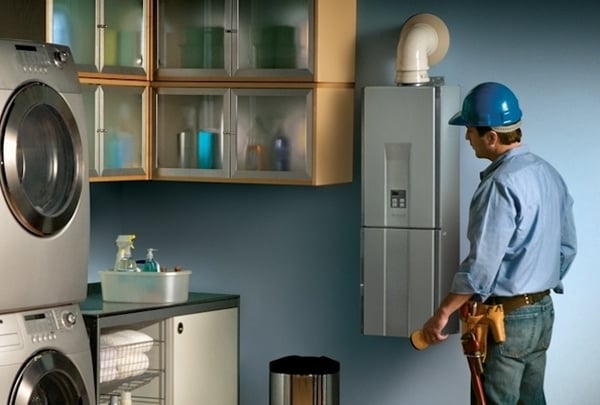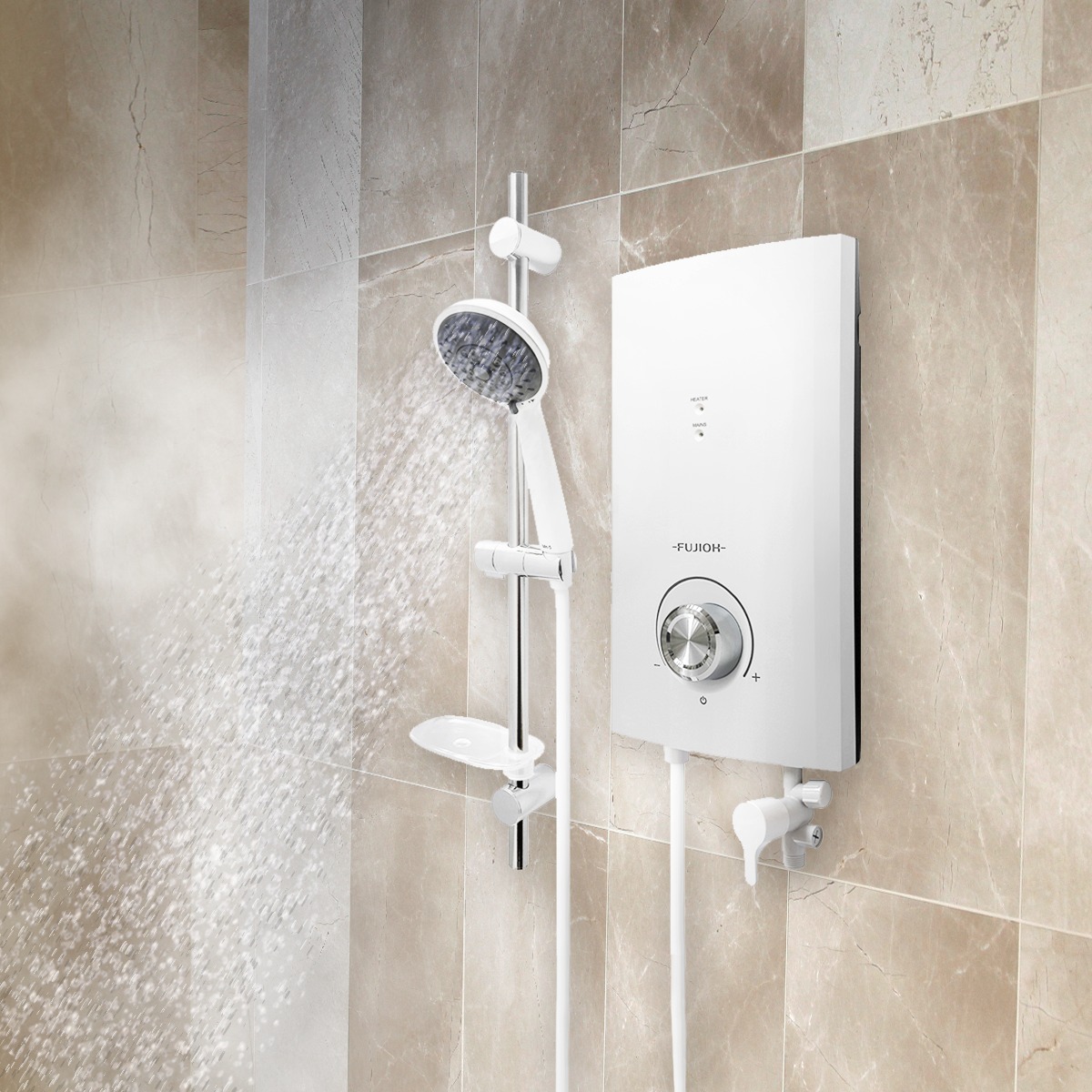Maximizing Home Comfort: The Benefits Of Tankless Water Heaters
Maximizing Home Comfort: The Benefits Of Tankless Water Heaters
Blog Article
This article which follows in relation to 5 Benefits of Tankless Water Heaters is absolutely engaging. You should see for yourself.

In a world where ease and performance preponderate, it's not a surprise that home owners are frequently in search of smarter ways to handle their home's power consumption and comfort. One development that has actually gradually gotten appeal is the tankless hot water heater. But just what makes these systems stand out from the traditional tank-based designs most of us grew up with? Allow's dive in and discover the advantages of tankless water heaters, helping you decide if it's time to make the switch in your home.
Intro
Image this: you enter the shower after a long day, anticipating a relaxing waterfall of hot water, just to be welcomed by icy droplets because the last individual utilized everything up. Audio familiar? Conventional hot water heater store a set quantity of hot water, implying you go to the grace of that container's supply. Tankless systems, on the other hand, warm water on demand. Say goodbye to running out mid-shower, say goodbye to fumbling with schedules simply to ensure warm water is offered.
Recognizing Tankless Hot Water Heater
What Are Tankless Hot Water Heater?
Tankless hot water heater, often referred to as on-demand or immediate water heaters, provide warm water just as it's needed. As opposed to saving gallons of pre-heated water, these systems kick right into action the moment you switch on the tap. Water passes through a warmth exchanger, warming up in real-time, suggesting you obtain an uninterrupted circulation of hot water without the requirement for a large storage tank resting idly by.
How Do They Differ from Typical Equipments?
Traditional heaters hold a reservoir of warm water, utilizing power to maintain that tank at a consistent temperature. Tankless devices eliminate the standing supply, reducing wasted power and the large impact of a huge cylinder. Essentially, you're upgrading from a "stockpile" mindset to a "made-to-order" technique.
Usual Kinds Of Tankless Devices
Tankless water heaters typically are available in two selections: gas and electric. Gas models have a tendency to deliver greater circulation prices, ideal for larger homes, while electrical models frequently offer smaller homes and are typically less complicated to install. Furthermore, some systems are developed for point-of-use (serving one component) while others can handle the whole home's hot water demands.
Trick Advantages of Tankless Hot Water Heater
Energy Performance and Cost Cost Savings
Say goodbye to heating up a titan tank's worth of water and keeping it cozy all day. Tankless heating units minimize standby energy losses, which can decrease utility bills. While the preliminary price could be greater, the long-term cost savings often justify the investment.
3. Space-Saving Design
If your home is short on storage space, getting rid of the cumbersome container liberates important room. Tankless systems are compact and can typically be placed on wall surfaces, stashed in corners, or installed in limited energy closets without hogging the entire space.
4. Longer Life-span
A properly maintained tankless water heater can outlast its tank-based cousin. Conventional storage tanks may last 10-15 years, while tankless models can keep chugging along for two decades or even more, making them a solid investment over time.
1. Endless Hot Water Supply
Ever before needed to schedule showers so everyone gets their reasonable share of hot water? With tankless, that comes to be a distant memory. As long as the heating unit's flow ability isn't surpassed, you can take back-to-back showers without becoming a popsicle.
5. Improved Water Top Quality
Keeping water in a tank can often cause sediment buildup or a somewhat "off" taste. With tankless systems, fresh water is heated up right away, lowering the possibilities of debris buildup and possibly providing cleaner-tasting water.
Factors to consider Prior To Changing
Though the advantages are compelling, it's a good idea to think about a couple of aspects prior to totally devoting.
Reviewing Your Home's Water Use Patterns
If your house simultaneously makes use of multiple components with high warm water need, make certain the system's circulation rate satisfies your requirements. Knowing your usage patterns aids you choose the ideal size and type of tankless heating unit.
Maintenance and Care Tips
Tankless systems are reasonably low maintenance, but they aren't set-it-and-forget-it devices.
Normal Cleaning and Descaling
Hard water minerals can develop in the heat exchanger, affecting efficiency. Routine descaling (frequently advised each year) keeps the system going for peak performance.
Annual Professional Examinations
A yearly checkup from a specialist guarantees small concerns are captured early. They'll analyze the device's efficiency, seek leaks, and aid preserve optimum performance.
Initial Investment Expenses
Tankless heaters typically feature a greater in advance price. Between the unit itself and possible setup modifications, the initial expense might provide you sticker label shock. However remember to view it as a long-term investment.
Setup Needs
Depending upon your home's facilities, you might require extra electric ability or gas line upgrades. Ensure you comprehend the installation needs and seek advice from a specialist to avoid shocks.
Guaranteeing Correct Ventilation
For gas models, appropriate air flow is essential to safely get rid of exhaust gases. Make sure venting systems are tidy and correctly mounted to prevent any type of potential safety threats.
Comparing Different Brands and Designs
Not all tankless hot water heater are created equal.
Researching Trustworthy Makers
Look for trusted brands with a background of generating top quality units. A trusted supplier typically provides much better consumer support and longer warranties.
Installation: Do It Yourself or Specialist?
While some house owners cherish dealing with tasks themselves, tankless installation might not be the very best time to burst out the toolbox.
Benefits and drawbacks of DIY Setup
A DIY mount can save money, but it includes threats. Wrong installation can result in ineffectiveness or security worries. If you come in handy and have experience, it may be feasible-- but proceed with caution.
Reading Evaluations and User Responses
Customer testimonials and responses from next-door neighbors or close friends who have actually gone tankless can use important insights. Occasionally, real-life experiences can be a lot more telling than advertising brochures.
When to Call a Specialist Plumbing Technician
For many, calling a professional guarantees everything's done appropriately. A professional plumber recognizes regional codes, sizing requirements, and venting specifications, reducing the threat of accidents.
Making the most of Effectiveness
You have actually bought a tankless device-- now maximize its performance.
Optimal Temperature Level Settings
Lots of people set their devices between 120-140 F. Changing the temperature level can boost convenience and financial savings. Experiment to locate a pleasant area that does not throw away power.
Pairing with Low-Flow Fixtures
Want to extend your system's capabilities? Take into consideration setting up low-flow showerheads and faucets. They decrease water usage, enabling your tankless system to supply a steady stream of warm water without straining.
Ecological Impact
Tankless hot water heater align with greener living objectives.
Reduced Carbon Impact
By utilizing less energy and just home heating water as needed, tankless systems can lower your home's carbon impact, lowering your ecological influence.
Conserving Natural Resources
Much less power intake and much less wasted hot water convert right into less natural resources being used, an ecological win-win.
Who Benefits The Majority Of from Tankless Heating systems?
The beauty of tankless heaters is that they can suit a selection of houses.
Huge Family Members vs. Single Occupants
Huge family members may love the endless warm water supply, while single passengers appreciate the power financial savings from not heating up a whole storage tank for just one person's early morning shower.
Property Owners with Minimal Space
If your home is short on square video footage, losing the bulky storage tank maximizes area for other basics-- or maybe simply more breathing space.
Eco-Conscious Consumers
Going tankless aligns with eco-friendly worths, ensuring you're not squandering power or sources.
Future Patterns in Tankless Hot Water Heater
The globe of home devices is ever-evolving, and tankless water heaters are no exception.
Innovations in Innovation
R&D is constantly boosting heat exchangers, making devices more efficient and durable. Future models might be even quieter, more portable, and far better fit for varying climates.
Smart Home Combination
Think of adjusting your water heater's temperature level using an app or getting upkeep informs on your phone. As wise home tech advancements, we'll see even more connectivity and benefit.
Verdict
Selecting a tankless hot water heater is more than just updating your home's hot water system; it's buying long-term convenience, energy effectiveness, and a greener way of life. By considering your household's water usage, bearing in mind installation demands, and devoting to regular upkeep, you can delight in a steady stream of hot water without the baggage of a large container. As technology develops, you can anticipate also smarter, a lot more efficient tankless services that not just make your life easier however also benefit the earth.
Why You Should Consider a Tankless Water Heater for Your Home
Energy Efficiency and Cost Savings
Tankless water heaters, also known as on-demand water heaters, heat water only when needed. This means they don't waste energy keeping a tank of water hot constantly. This efficiency translates into substantial cost savings on your monthly energy bills.
Endless Hot Water Supply
One of the significant advantages of tankless water heaters is their ability to provide a continuous supply of hot water. Traditional tank water heaters have a limited capacity and can run out of hot water, especially during peak usage times. In contrast, tankless water heaters can provide an endless stream of hot water, making them ideal for larger families or homes with high water usage.
Space-Saving Design
Tankless water heaters are compact and take up significantly less space compared to traditional tank heaters. They can be installed on walls, under cabinets, or even outside, freeing up valuable space in your home. This makes tankless water heaters a great option for smaller homes or properties with limited space for a traditional water heater.
Longer Lifespan and Lower Maintenance
Tankless water heaters typically have a longer lifespan compared to traditional tank heaters. They can last up to 20 years or more with proper maintenance. Additionally, tankless systems are designed with replaceable parts, which can extend their lifespan further and reduce long-term maintenance costs.
Environmentally Friendly
Reducing energy consumption not only saves you money but also benefits the environment. Tankless water heaters contribute to a smaller carbon footprint by using less energy to heat water. Their energy efficiency and ability to minimize standby heat loss make them an eco-friendly choice for environmentally conscious homeowners.
Customized Temperature Control
Tankless water heaters offer precise temperature control, allowing you to set the desired temperature to meet your specific needs. This level of customization ensures you always have water at the perfect temperature for your comfort and usage requirements.
https://beantownservices.com/blog/consider-tankless-water-heater-for-your-home

I ran across that article about 5 Benefits of Tankless Water Heaters while doing a search on the internet. Kindly take the time to distribute this blog post if you liked it. Many thanks for going through it.
Click Here Report this page